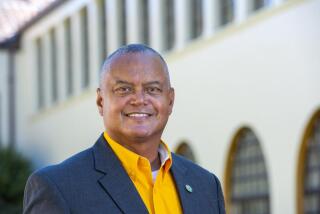Harvard Presidents Used to Be Players
In some ways, the flap over Harvard President Lawrence Summers’ now infamous comments was less about whether women lack an innate aptitude for science and math than it was about whether a university president should even dare discuss such a volatile issue.
These days we’re not used to hearing university presidents inject themselves into hot-button social debates. In recent years, the presidents of American universities have stepped away from the national stage; their primary responsibility is the all-important business of fundraising, which means saying nothing that might shut off the cash flow.
But it wasn’t always like that; university presidents weren’t always so self-censoring. For most of the last century, in fact, they tended to be prominent public figures -- intellectual celebrities -- and many believed it was their professional duty to weigh in on the most controversial issues of the day. Nowhere was this more true than at Harvard.
The public stature of Harvard’s presidents grew along with that of the university, which began as a parochial New England institution and became a national one over the course of the 20th century. In 1927, President A. Lawrence Lowell sat on a three-man panel that reviewed the death sentences of Nicola Sacco and Bartolomeo Vanzetti, who had been convicted of murder in Massachusetts. The patrician Bostonian disliked the two immigrant anarchists, and his panel quickly affirmed their convictions on murder charges. It was not Harvard’s finest hour. Lowell’s involvement had more to do with his own sense of the proper social order than with using his office to advance Harvard’s agenda, yet no one questioned the propriety of a Harvard president condemning two men to death.
Nathan Marsh Pusey, Harvard’s president from 1953 to 1971, had his public moment when Sen. Joseph McCarthy charged that the campus was teeming with Reds. “Someday I am sure that we shall all look back on the hateful irrationality of the present with incredulity,” Pusey declared.
The student unrest of the 1960s took Pusey by surprise and ultimately led to his resignation. He was replaced by Harvard Law School Dean Derek C. Bok, who had to chart a conciliatory course. In an increasingly diverse and divided nation, a university president had to choose his political stands with care. American universities -- Harvard, in particular -- were getting richer and richer, and their economic decisions had political consequences. Should Harvard stop investing in South Africa? Should it boycott Nestle products over a charge that the company was addicting mothers in the developing world to its infant formula?
Bok worried about the idea of a university disengaging from society. “Unless we choose to live like hermits in the desert, we must all be linked in indirect and innumerable ways to the wrongs of the world through the goods we buy, the taxes we pay, the services we use, the investments we make,” he wrote.
Maybe so. But over time, Bok trimmed his public role. One tangible reason: The university was receiving more and more money from the federal government -- it now gets more than $400 million a year in federal grants -- and the president could not afford to jeopardize such largess.
His successor, Neil L. Rudenstine, was quieter still. Rudenstine’s primary task was to lead a $2.6-billion fund drive; he once estimated that he had to raise a million dollars every day. Although Rudenstine was a staunch defender of affirmative action, he generally didn’t speak out on public issues. For one thing, he didn’t have the time; fundraising is time-consuming work. And talking politics could alienate wealthy alumni.
Another inhibiting factor was the changing composition of the student body. After World War II, Harvard had become an increasingly diverse place, accepting students from all over the country. The university began to shed its history of anti-Semitism, taking in Jews in significant numbers.
After the 1960s, women, blacks and Latinos also played a larger role in university life. Later on, Asians and gays would become highly visible presences on campus. As a result, any political proclamation from the president was increasingly likely to offend someone.
Summers found this out the hard way. When he criticized a petition urging Harvard to cut its investments in Israel and called its signers “anti-Semitic in their effect if not their intent,” he won praise from Jews but offended Muslims and Christian students from the Mideast. When he dressed down black professor Cornel West, he was seen as insulting African American studies generally. And when he addressed the paucity of women in science, he failed to realize just how sensitive the issue was with women.
Society still cares what university presidents think and say. But at Harvard, the question remains whether its president can play such a role without damaging his university.
More to Read
Sign up for Essential California
The most important California stories and recommendations in your inbox every morning.
You may occasionally receive promotional content from the Los Angeles Times.










